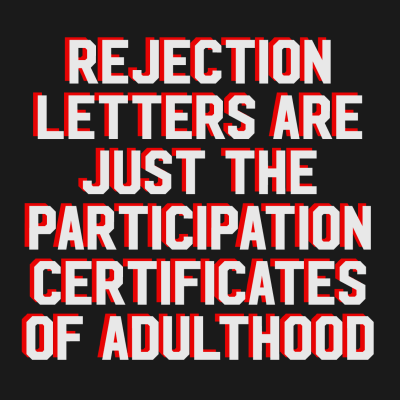I’ve been rejected from some great jobs. In high school, I failed to win a summer job as a cabana boy at a luxury resort. After college, I was rejected by investment banks and from a plum teaching position in China.
Terms like “many qualified candidates,” “extremely competitive process” and “other applicants who more closely meet our needs at this time” became part of my lexicon. The LinkedIn profile of my rejected jobs would be impressive indeed. (How do I hire that guy?)
Still, it seems clear that job rejections are headed for the nostalgia pile, alongside Pop Rocks, big hair, Fanta and hockey fights. Before too long, we’ll look back on the era of rejection letters as “the good old days.”
Long ago, television and movie production companies stopped allowing just anyone to submit ideas. The reason? Studios that accepted and reviewed ideas found themselves on the wrong end of copyright lawsuits when new shows and films bore any similarity to submissions.
Likewise, the U.S. Department of Labor is providing employers with a similar disincentive for accepting unsolicited applications for employment. In September, the DOL sued Palantir for biased hiring processes because Asians were underrepresented in new hires relative to applications.
But the primary engine of change in hiring is more technology than regulatory. If you haven’t met Mya in your job search, you will soon. Mya is a bot from the company FirstJob that allows employers to recruit, engage and screen candidates before moving forward with an application for employment. Screening questions are contextual based on an analysis of candidates’ declared competencies vs. the job description. To get to a hiring manager, you’ve got to get by Mya first.
Many companies won’t even want you to meet Mya or her sister bots until you complete a challenge or two. HackerRank and CodeFights require candidates to demonstrate coding competencies in challenges before inviting them to apply for a job. Sqore and Knack partner with employers in a range of industries to create custom challenges to serve as gates at the top of the hiring funnel.

In some markets, employers don’t allow candidates to enter the funnel unless they’ve taken a longer assessment demonstrating not only technical skills but cognitive skills — like critical thinking and problem-solving.
In India, the emergence of thousands of new private universities over the past several decades has yielded millions of college graduates with questionable skills. Surveys show that up to 80% of engineering graduates aren’t qualified to work in the technology sector and 47% of graduates fail to qualify for entry-level positions in any profession.
As a result, hundreds of large and mid-size employers only allow students to apply for a position once they have taken a new standardized assessment: the AMCAT, an employment assessment from global credentialing leader Aspiring Minds.
Paired with emerging people analytics technologies, which allow employers to track the performance of employees, profile indicators of future success, and feed those back into job descriptions, intelligent applicant tracking systems not only identify candidates for open positions today, but prospective candidates based on relevant demonstrated competencies who may be a few years away in terms of their development.
It’s not that every employer will follow the professional sports model, engaging in a labor intensive search for talent and working to develop that talent at great expense. But employers will use technology to identify and develop talent in a hands-off, low-cost manner.
Your firm has to hire 100 entry-level salespeople every year? No problem. Your intelligent applicant tracking system has already identified 250 college freshmen and sophomores whose demonstrated curricular and co-curricular competencies correlate to sales success, and either advised them to take a course in business statistics or invited them to participate in a short online course, the result of which will be an invitation to interview for a summer job.
As employers adopt intelligent bots, challenges, and rethink what applicant tracking systems can do to improve hiring processes, candidate pools will start with far fewer false positives and false negatives. This will mean fewer bad hires, better employee retention and – perhaps due in part to less lost sleep from being rejected due to an “extremely competitive process” – higher overall productivity.
